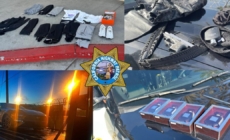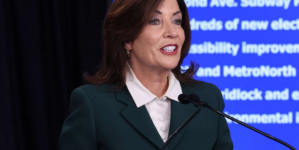-
Growing speculation that plane was brought down by Russian air defenses - 12 mins ago
-
Proposed Plan to Block Donald Trump from Taking Office Sparks MAGA Fury - 27 mins ago
-
Which NFL players stand to earn over $100K (or over $1M) these final weeks? - 32 mins ago
-
Holiday crackdown nets over 100 retail theft suspects in California - 54 mins ago
-
Fox News Hosts Sean Hannity and Ainsley Earhardt Announce Engagement - about 1 hour ago
-
2024-25 College Football Playoff: Bracket, schedule, rankings, scores, more - about 1 hour ago
-
Houston woman allegedly zip-tied girl, taped her mouth, and locked her in cage next to Christmas tree - 2 hours ago
-
NY Governor Signs Law That Charges Companies for Greenhouse Gas Emissions - 2 hours ago
-
Dianna Russini weighs in on the fit between Pete Carroll and Caleb WIlliams | The Herd - 2 hours ago
-
Severed leg washes ashore in Palos Verdes Peninsula, prompting search - 2 hours ago
An early and senseless end to a fabulous but troubled life
True Beatles fans well know the name Mal Evans, while casual fans may not. If not, recall the film of the “Rooftop Concert” at Apple in January 1969. Evans is at the door onto the roof trying to stall the police who want to stop the noise. Or the “Get Back” films of the Fabs rehearsing at Twickenham in that same month. It’s Mal who makes the tea and toast.
There are more “Mal moments”, as any Beatles aficionado would know. He was the one counting the bars in the middle of “A Day in the Life” before the alarm clock and Paul McCartney’s bit. Plus he contributed occasional handclaps, percussion and sound effects to recordings, such as the spade in gravel during “You Know My Name (Look Up The Number)”.
Womack takes us deeper. Evans helped McCartney when he was stuck on a line for “Here, There and Everywhere”, and “Fixing a Hole” was actually a McCartney-Evans composition, though Mal willingly agreed to the group using the regular credit of Lennon-McCartney. Then he never received the promised publishing royalties; without complaint, as usual.
Post-Beatles, Evans appeared with John Lennon when the latter sang “Instant Karma” on “Top of the Pops” in February 1970. Mal, in his horn-rimmed glasses and grey suit, and banging a tambourine, looked a bit incongruous among the showy Plastic Ono Band.
It’s fairly surprising that of the 1000-plus books about the Beatles, none has ever been dedicated to Evans. Everyone else has written one, from chauffeur to hairdresser. Here, there’s an engaging backstory as to how Womack has finally come to relate a singular life.
First, let’s recall that Evans was shot dead by Los Angeles police when he pointed a gun at them in January 1976. Aged only 40, he had been on a downward spiral of alcohol and cocaine. His son Gary says his father simply couldn’t stomach living another day and orchestrated his own demise in an apparent case of “suicide by cop”.
Evans had drafted a memoir about travelling the world with his “boys”, to be called “Living the Beatles’ Legend: 200 Miles to Go”. (Two hundred miles was roughly the distance he would drive the group between Liverpool and London.) He had also kept diaries and notebooks with drawings and recollections, and he took thousands of candid photos and saved a lot of ephemera such as scraps of lyrics and receipts.
A United States publisher made various attempts to bring out the memoir but his estranged wife Lily wanted the collection returned to the family in England, to sort it out themselves. The publisher transported everything from LA to New York City and the materials ended up in a storage room in the basement of the New York Life Building.
They stayed there for more than a dozen years and eventually would likely have been dumped, but a temporary worker alerted Yoko Ono, who in turn contacted the head of Apple, Neil Aspinall, in London. He set lawyers on the job and the hoard was finally delivered to the Evans family home in England in 1988.
Truly a Holy Grail for Beatles “scholars” and fans, nonetheless the material lay in the Evans attic until 2018 when Womack, with other Beatles books to his credit, became entrusted as the right person for a full-length biography, in and out of the Fabs. Ringo Starr had told Mal about writing the memoir, “ If you don’t tell the truth, don’t bother doing it”, and finally here it is, warts and all, as they say. The warts may account for the undecided times in storage.
This book would surely satisfy the greatest enthusiasts. The Mal factor can’t be separated from the group, and so here is a lengthy history of the Beatles, some of which is new and some not, and a first real telling of how Evans suffered after the break-up of the Fabs in 1970.
Back to the beginning, as told by Womack, Malcolm Frederick Evans was born in Liverpool on May 27, 1935, and was a telecommunications engineer for the General Post Office when he started watching the Beatles in the Cavern, a sweaty basement in Mathew Street, Liverpool, where the nascent group played regularly to loyal audiences between 1961 and 1963.
A tall and solid man, his outsize appearance belied a good-natured demeanour. “Big Mal” became a part-time bouncer at the club and he befriended the Beatles. He was their protector during the tense time when drummer Pete Best was sacked and Ringo made his controversial Cavern debut on August 19, 1962. Fans gave George Harrison a black eye.
Neil Aspinall was their road manager but went down with flu in the big freeze of the 1962-63 winter, and so in January 1963 Mal was asked to drive them in their Ford Thames van to London for promotional appearances in support of the “Please Please Me” single.
Soon he quit the GPO to shepherd the group, becoming a devoted and indispensible part of their inner circle as roadie, personal assistant, protector, fixer, gofer and, importantly, trusted friend. Mal was there for the entirety of Beatlemania, and loved serving the Fab Four.
In those heady years when they conquered the world in unprecedented fashion, Mal filled their every need. He and Aspinall picked the females who would satisfy the carnal delights of John, Paul, George and Ringo. Often the ladies had to submit to Mal and Neil first. Mal carried the marijuana, rolled their joints and smoked a cigar on planes to cover the smell.
He loved the lads and he loved the life, hobnobbing with such as Elvis Presley, Frank Sinatra and Burt Lancaster, and visiting far-off Japan, the Philippines, Australia and New Zealand, for instance. But it played havoc with his marriage, being absent often and carelessly leaving women’s letters and phone numbers that Lily found in his suitcases when he finally returned.
His own letters home were infrequent, as he was torn by his competing responsibilities to the family and to the Beatles. He missed the birth of his seond child and eventually abandoned his family entirely. “Lil, why don’t I ring you?” he wote in his diary. “[I] keep making excuses to myself as to why I shouldn’t. I think I’m frightened you will shout at me.”
She too was dismayed. “He’d been such a considerate husband. Now it was worse than him having another woman. It was like him having four mistresses: John, Paul, George and Ringo.” Mal wondered: “Have I destroyed my happiness / Cutting down my family tree?” But his guilt rarely changed his behaviour. Inside that large body, Mal was basically a child. When the Beatles ended, his growing role at Apple lessened. He assisted their solo careers for a while but basically lost self-esteem and identity. Finally, he grew tired of sublimating his own needs. He wanted a new creative life as a songwriter or as a producer or engineer in a studio, but it was difficult to shed his old self – once thought of as a roadie, always a roadie.
On January 9, 1975, the London High Court formally dissolved the group’s partnerhip. The Beatles and Company no longer existed, leaving Mal and Neil unemployed. Undoing the spell was no easy feat, plus Evans settled into life with a girlfriend in California. His conflicting emotions tore him apart as he missed his children and pained his wife in England.
Lil wanted a divorce. He got drunk and depressed, took Valium to sleep and had an increasing dependence on cocaine, This exacerbated his low self-worth, and when he became dejected his capacity for self-pity could feel overwhelming.
He lost control one day and shot at the fridge. The police were called and he was told to drop his Winchester rifle. He apparently replied, “No. Blow my head off.” And that was that.
This account would have to be one of the superior entries in the Beatles literary canon.
Source link
























